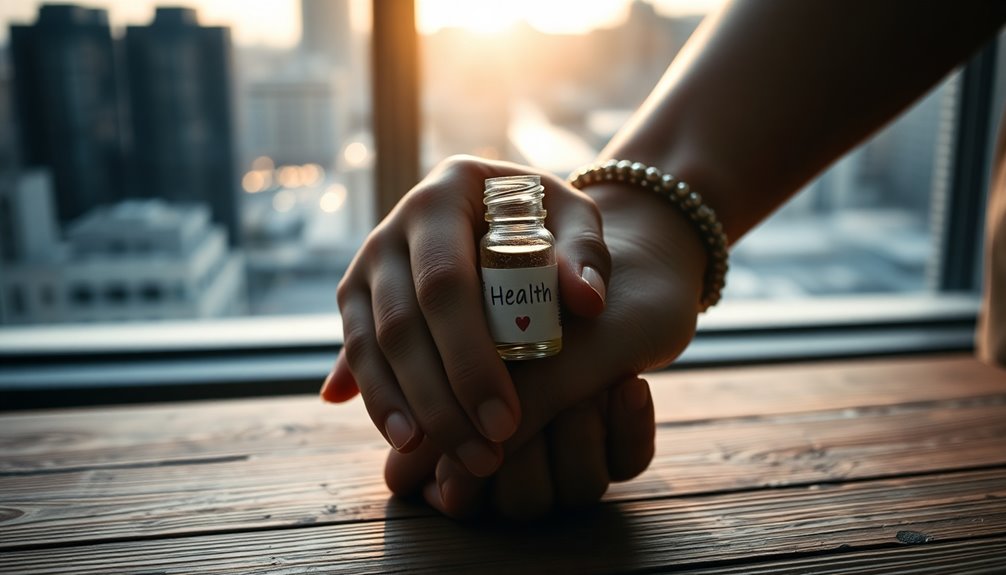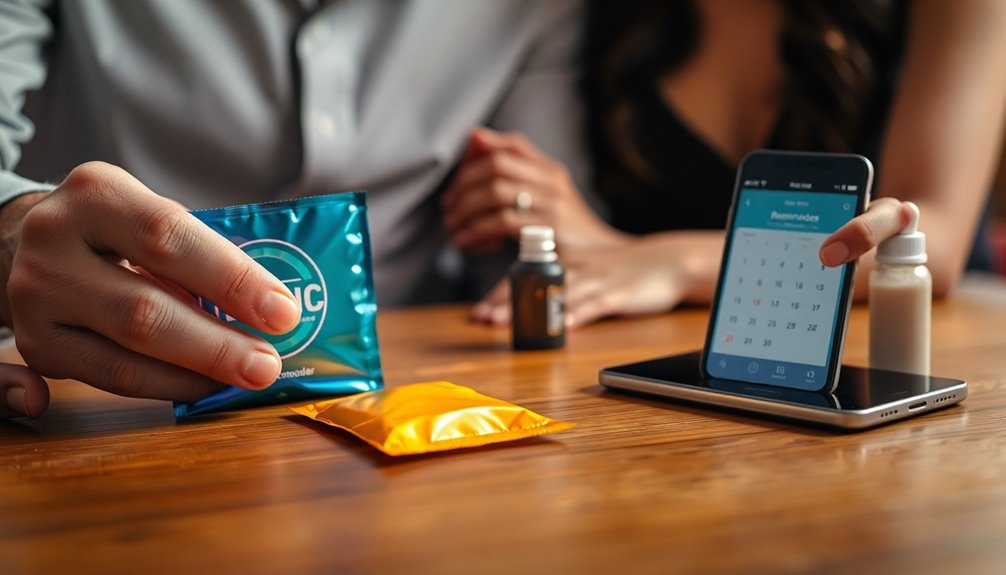Yes, you can get an STD without having sex. STDs can spread through skin-to-skin contact, kissing, or sharing personal items like razors. Even intimate touching carries a risk, especially if there are sores or rashes involved. Bloodborne infections can also be transmitted through unclean items. Additionally, oral-to-anal contact can pass certain infections. With up to 90% of infections being asymptomatic, regular testing is vital for awareness. It's important to understand all the ways STDs can be transmitted for your overall health. Learn how to protect yourself and stay informed about your risks.
Key Takeaways
- STDs can spread through skin-to-skin contact, including kissing and intimate touching, without sexual intercourse.
- Sharing personal items, like razors or toothbrushes, can transmit bloodborne infections such as HIV and Hepatitis B.
- Oral-to-anal contact may facilitate the transmission of infections like Hepatitis A, even without traditional sexual activity.
- Damp towels and genital touching can lead to the spread of infections like trichomoniasis and HPV.
- Awareness of nonsexual transmission is crucial for understanding and preventing STDs effectively.
How STDs Are Transmitted

When you think about STDs, you might assume they only spread through sexual intercourse, but that's not the whole story. STIs can be transmitted through skin-to-skin contact, making kissing and intimate touching potential routes for infections, even without penetrative sex.
Bodily fluids are essential in this transmission process, as infections can spread through oral sex or by sharing unclean sex toys. Certain STDs, like herpes and syphilis, can transmit through direct contact with sores or rashes, increasing the risk from nonsexual interactions.
Additionally, sharing personal items like razors or toothbrushes can facilitate the spread of bloodborne infections such as HIV and Hepatitis B, stressing that these infections can occur through various routes unrelated to sexual activity.
Nonsexual Transmission Methods
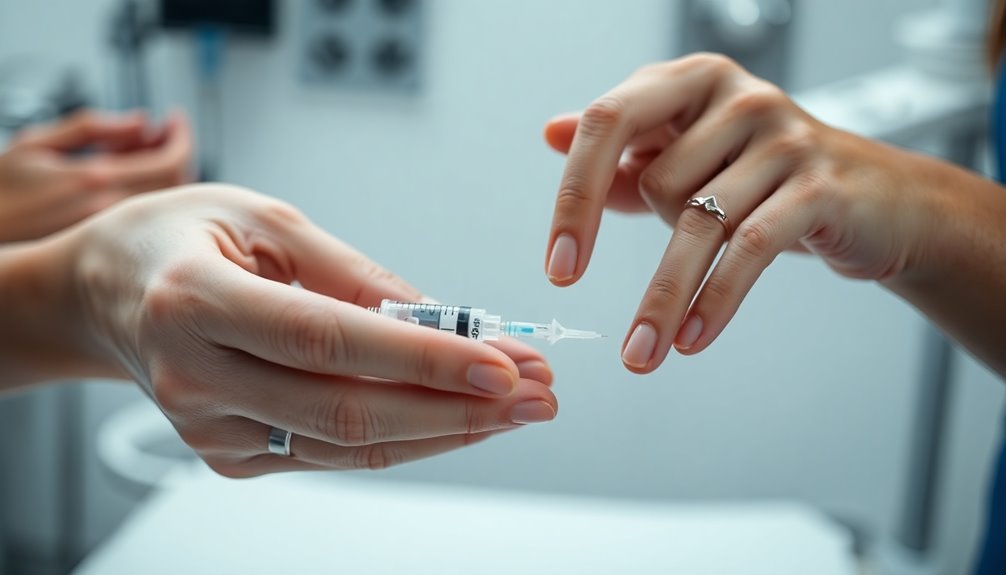
Although many people associate STDs solely with sexual activity, it's crucial to recognize that nonsexual transmission methods can also pose significant risks.
Certain STIs, like herpes and cytomegalovirus, can spread through skin-to-skin contact, including kissing. Sharing personal items, such as razors or toothbrushes, heightens the risk of bloodborne infections like HIV and Hepatitis B.
Intimate activities, including oral-to-anal contact, can transmit Hepatitis A and other infections. Additionally, damp towels and genital touching can facilitate the spread of trichomoniasis and HPV.
Many individuals remain unaware of these nonsexual contact transmission routes, underscoring the need for education and awareness about STIs. Protecting yourself involves understanding these risks just as much as those associated with sexual encounters.
Importance of Regular Testing
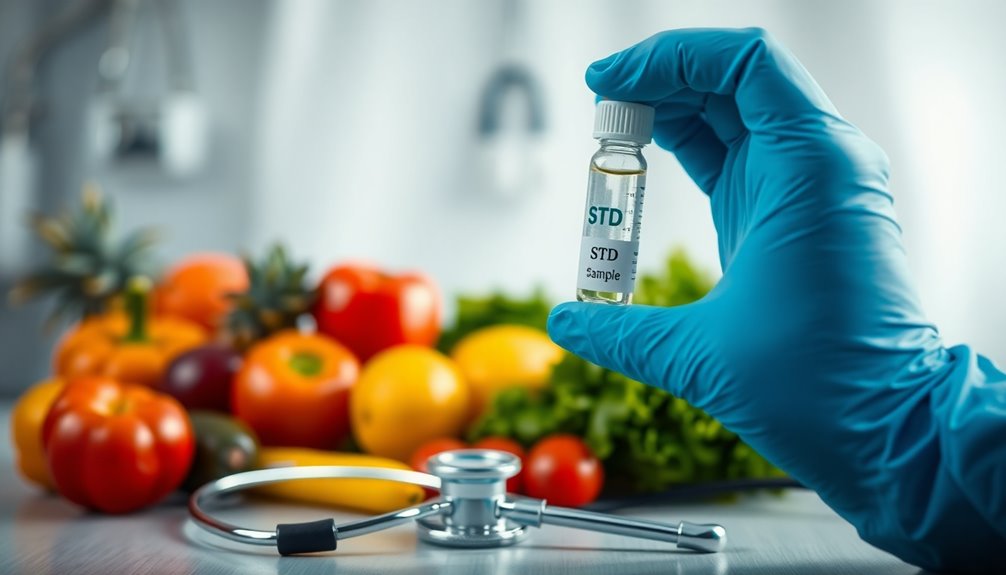
Understanding the various ways STDs can be transmitted highlights the importance of regular testing. With up to 90% of infections being asymptomatic, you mightn't realize you're infected without routine STD tests.
The CDC recommends getting tested annually if you're sexually active, promoting awareness of your sexual health and encouraging responsible sexual behavior. Regular testing can lead to early detection, helping to prevent complications and facilitate timely treatment.
It also reduces the risk of catching and spreading infections to your partners and the community. Before engaging with new sexual partners, consider testing to address any potential infections promptly and guarantee everyone's safety.
Prioritizing regular testing is essential for maintaining your health and that of others.
Signs and Symptoms to Watch
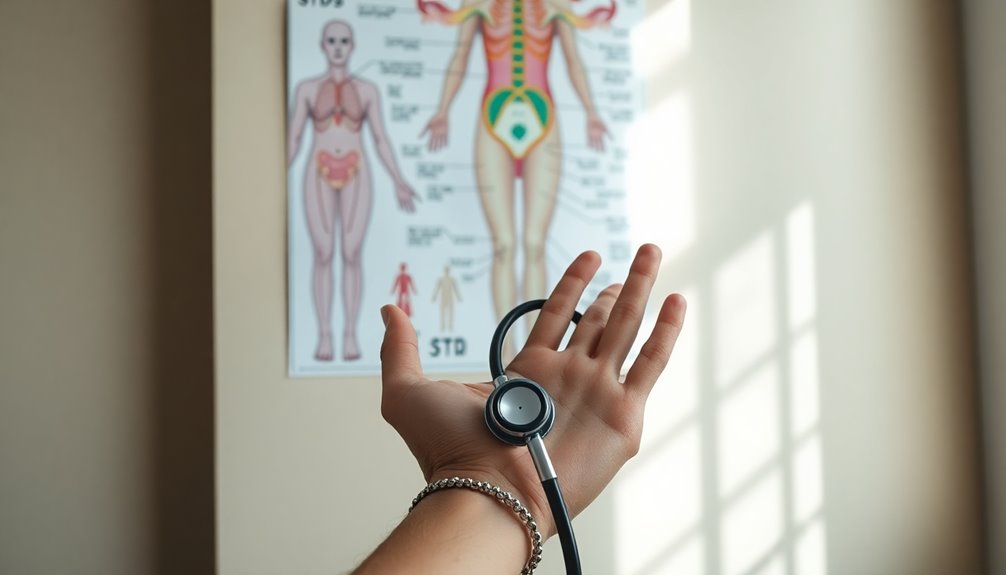
Recognizing the signs and symptoms of STDs is essential for maintaining your sexual health. Many STDs can be asymptomatic, so it's important to be vigilant.
Watch for these key symptoms:
- Unusual discharge: Any foul-smelling or abnormal discharge from the genital area should raise concerns.
- Sores or blisters: Look out for sores on the genitals or mouth, as they can indicate an infection.
- Flu-like symptoms: Symptoms like fever, fatigue, and swollen lymph nodes may suggest a potential STD.
Additionally, pain during urination or signs of public lice can signal an issue.
Since up to 90% of STDs show no symptoms, regular screenings are essential for early detection and effective treatment. Furthermore, understanding the importance of emotional dysregulation can help individuals manage stress and anxiety related to health concerns.
Don't ignore these signs—your health depends on it.
Effective Prevention Strategies
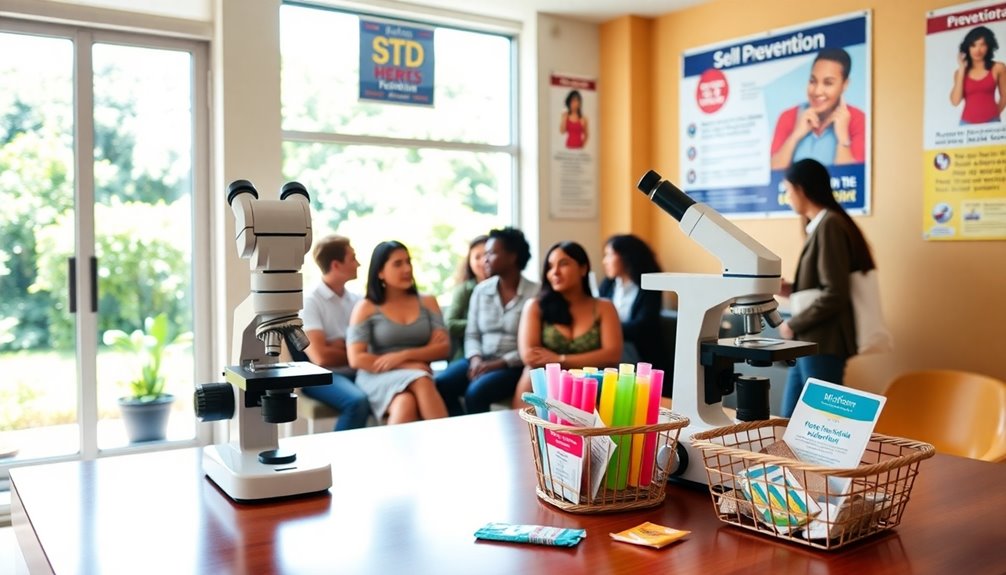
To effectively prevent STDs, you should adopt a combination of strategies that address both sexual and non-sexual transmission routes.
Start by using barrier methods, like condoms and dental dams, during all sexual activity to reduce transmission risk. Regular STI testing is essential, as many asymptomatic infections can still pose a threat.
Avoid sharing personal items, such as razors, toothbrushes, and sex toys; instead, make sure to clean your sex toys before and after use. Practicing good hygiene, including handwashing, can also minimize risks through non-sexual contact.
Finally, consider vaccination against certain STDs, like HPV and Hepatitis B, to provide effective protection against infections that can spread without sexual activity.
Frequently Asked Questions
Is It Common to Get an STD Without Having Sex?
It's not common, but it can happen. You might contract an STD through activities like kissing or sharing unclean sex toys.
Certain infections, like herpes and HPV, can spread through skin-to-skin contact. Oral sex also carries risks for STDs, even without penetrative sex.
Plus, sharing razors or needles can expose you to infections like HIV. Regular testing is essential, as many people don't show symptoms and might be unaware of their status.
Can STD Develop on Its Own?
Did you know that around 1 in 5 people in the U.S. have an STD?
They can't develop on their own; they need exposure to infectious agents. You mightn't notice symptoms right away, as many infections are asymptomatic initially.
Skin-to-skin contact or sharing contaminated items can also spread certain STDs.
Regular testing is essential for early detection and managing your health, so stay proactive and informed about your sexual health.
What's the Easiest STD to Catch?
When you think about the easiest STD to catch, Chlamydia often comes to mind. It's highly transmissible through vaginal, anal, or oral sex, and many people don't show symptoms, making it easy to spread unknowingly.
Gonorrhea follows closely, with millions of cases reported each year. HPV is also prevalent due to skin-to-skin contact.
Can You Get STD if Both Partners Are Clean?
Even if you and your partner appear clean, you can still get an STD. Many infections don't show symptoms, so you mightn't realize either of you carries something.
Skin-to-skin contact or sharing personal items can transmit certain STDs, like HPV or herpes, regardless of your sexual history.
Regular screenings are essential to know your status, and vaccinations can help protect against preventable STDs, ensuring you're both as safe as possible.
Conclusion
In the dance of health, staying informed is your best partner. While sex is a common stage for STDs, remember that the spotlight can shine on other paths too. Regular testing and awareness are your shields, guarding against unseen foes. So, keep your eyes open and your knowledge sharp—don't let ignorance lead the way. Embrace prevention like a trusted friend, and you'll waltz through life with confidence, knowing you've taken the steps to protect your well-being.

